State Universities as Legal Entities: Between Autonomy and Equality
Ahmad Tholabi Kharlie
Professor at Syarif Hidayatullah State Islamic University Jakarta
Member of the National Council for Higher Education (DPT)
Jakarta – The transformation of Indonesian public universities into Perguruan Tinggi Negeri Berbadan Hukum (PTN-BH), or state universities with legal-entity status, marks one of the most ambitious reforms in the history of national higher education. This status grants universities wide-ranging autonomy over academic affairs, financial management, and institutional partnerships. The expectation is that institutions will become more agile in responding to global developments, fostering innovation, and reducing reliance on the state budget.
The reform has indeed delivered notable achievements. Several PTN-BH institutions have climbed international rankings, expanded the volume of reputable publications, and built stronger global research networks. Many laboratories have produced technological innovations, some of which have evolved into research-based startups. In terms of governance, bodies such as the Majelis Wali Amanat (Board of Trustees) and the Academic Senate have made decision-making processes more structured.
However, pressing dilemmas obscure these successes. PTN-BH functions both as a testing ground for modern governance and as a mirror reflecting the unpreparedness of Indonesia’s higher education system to confront questions of social justice.
The PTN-BH Dilemma
Public criticism has largely centered on rising tuition fees. While universities provide scholarships, the support often falls short of meeting the needs of underprivileged students. Such criticism has fueled perceptions that PTN-BH institutions are evolving into elitist campuses, drifting away from the constitutional mandate to make education accessible to all citizens.
The American philosopher John Dewey once reminded us in 1916: “Education is not preparation for life; education is life itself.” Education should never be treated as a commodity reserved for the privileged but rather as an inseparable part of human existence. If financial barriers block access, PTN-BH risks losing its moral legitimacy.
Another challenge lies in balancing the three principles of higher education—teaching, research, and community service—against pressures to generate revenue. Market-driven priorities often prevail, as seen in the proliferation of popular, high-cost programs, while disciplines such as philosophy, regional literature, or basic sciences receive less attention.
This trend reflects a troubling reduction of autonomy through commercialization. Autonomy should ideally expand academic creativity, strengthen research, and enhance public engagement. Left unchecked, universities could be trapped in a corporate mindset that prioritizes profit over scholarship and humanity.
In practice, despite their independent status, most PTN-BH institutions remain heavily dependent on the state budget. Research funding, faculty salaries, and core operational expenses still come largely from government allocations. While alternative sources—business ventures, industry collaborations, alumni donations—are emerging, their contributions remain limited.
A global comparison underscores this structural weakness. In the US, public universities enjoy autonomy but rely on a diverse mix of state funding, tuition, competitive research grants, and alumni endowments. In the UK, universities operate as independent legal entities but charge significantly higher tuition. Meanwhile, countries like Germany and Singapore maintain robust government support, framing higher education as a public good beyond the reach of pure market mechanisms.
The Role of Government
Recognizing these challenges, the government has introduced corrective measures. Comprehensive evaluation tools such as the Indikator Kinerja Utama (Key Performance Indicators) have been tightened; targeted subsidies, including the KIP Kuliah program, are expanded; and auditing mechanisms are strengthened. Alumni are encouraged to contribute to endowment funds, while partnerships with state-owned enterprises and industry are being scaled up.
The approach reflects a moderate stance by maintaining state oversight without stifling innovation. Nevertheless, disparities persist. Universities in Java, with easier access to industry partners, advance more quickly than institutions in less developed regions. Addressing this imbalance must be a priority to prevent PTN-BH from merely widening inequality rather than fostering equitable progress.
Therefore, PTN-BH remains an unfinished experiment. Its future depends on how government, universities, and society at large strike a balance between autonomy, accountability, and social justice.
Institutional autonomy is indispensable for global competitiveness. But without equitable access, PTN-BH risks losing its constitutional essence. Higher education is a citizen’s right, not a privilege for the few.
The challenge today is to ensure that PTN-BH becomes a sustainable ground for nurturing a generation that is intelligent, critical, and socially just. In this lies its true meaning—not merely autonomous, but inclusive and human-centered.
This article was first published in Detik on Wednesday (September 24, 2025).

